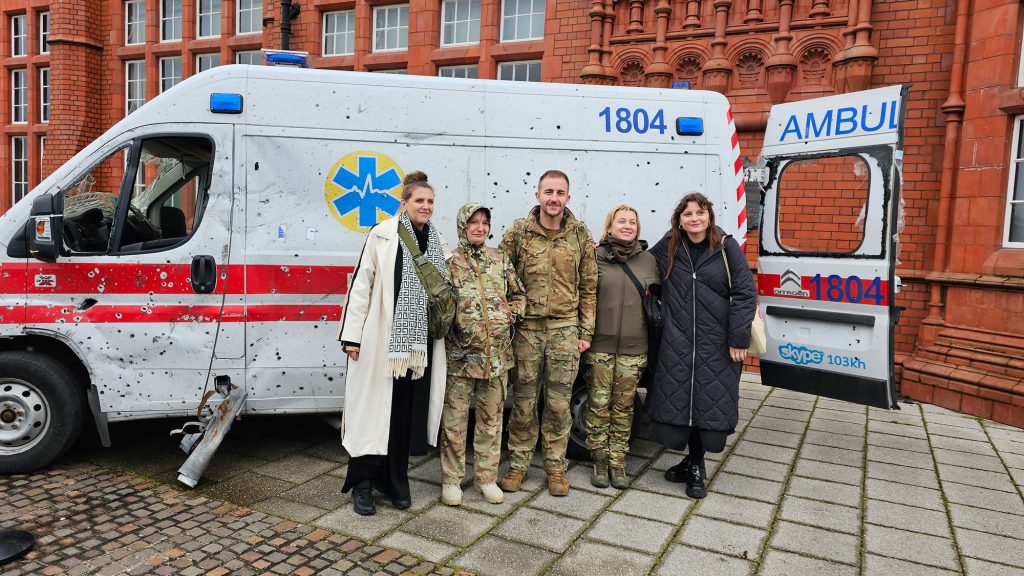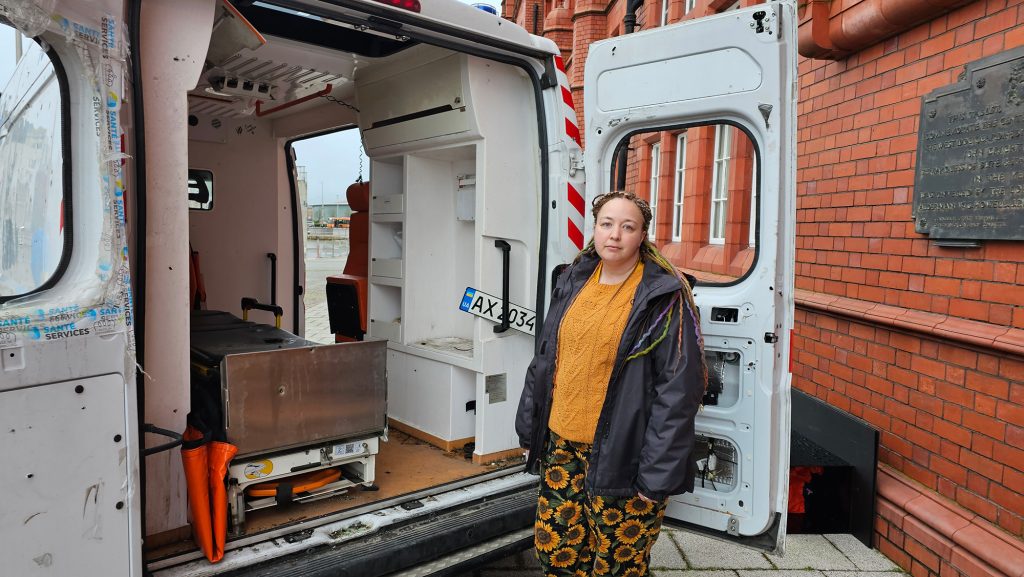They have been touring the UK to tell people how medical staff and civilians are being targeted by Russia
BRANDON Mitchell used to be a soldier in the British army, but now he saves lives as a medic in Ukraine.
On March 16, 2022, three weeks after Russia’s full-scale invasion of Ukraine, he hopped on a train to Lviv despite not knowing the language.
He said: “I felt obliged to go and help in whatever capacity.”
“There are days we were driving around the city and picking up wounded and killed civilians just on the streets.”
Originally from Canada, he moved to the UK to serve in the British army and continued living here for 15 years.
Working in the events industry, he travelled all across the country, before finding himself bankrupt due to the pandemic.
He said: “For better or worse I was in a transition period in my life but I was really motivated.”
Now 37, he’s been a medic for two years, only leaving once to see his family, and twice to tour the UK.
Along with fellow medics Kateryna Pryimak and Iryna Knyzhnyk, he is fundraising and spreading awareness of Russia’s targeting of medics and civilians.
Iryna Knyzhnyk said: “There are days we were driving around the city and picking up wounded and killed civilians just on the streets.”
Travelling with them is an ambulance riddled with bullets taken from Kharkiv in late October.
Jess Daly, a journalist from Cardiff now based in Ukraine, who organised the tour, said: “It is in fact a very good-looking ambulance compared to many that these medics have worked with – often they’re burned to ashes.
“Hospitals are regularly targeted, especially in those areas that were once occupied.”
Kateryna Pryimak said: “Once, on this rotation near Kherson, we survived a gas attack, a chemical attack. This is prohibited but they use it against medics, against civilians, against soldiers.”
Kateryna studied cultural studies before joining a medical battalion in 2014 when war first broke out in Eastern Ukraine.
“I mean, these people they’ve had to flee for their safety but they’ve got their own language, they’ve got their own culture, and that’s something that needs to be protected.”
Now 31, she worked in television after being demobilised in 2015 before campaigning for women to have a greater role in the military.
After the full-scale invasion in 2022, she voluntarily signed up as a medic to support the war-effort.
She said: “Unfortunately our people don’t have a choice or the Russians will kill us – we need to defend ourselves.
“I’m lucky because I have this choice and also, we don’t mobilise women in general, only newcomers who have the will to serve.
“I think we need to involve women more because a lot of them have this potential and have this desire to protect our home.”

She said: “I hope that people continue to support Ukraine, it’s important because it’s not about choosing a side, it’s about choosing if you’re human or not.”
The event was organised by Beth Arthur, a 34-year-old biomedical scientist at the University Hospital of Wales, Heath, and member of Stand with Ukraine Cardiff.
When the full-scale invasion started she gave her spare room to a Ukrainian refugee, and started going to weekly protests against the war to help her meet other Ukrainians.
Beth was soon going every week and gradually got more involved with the group.
She said: “You hear there were strikes, but when you speak to somebody going, ‘yeah that was my grandparent’s building, but thankfully we’ve managed to move them to a different location that’s not been targeted’ – it brings it all home and makes it real somehow.”

Stand with Ukraine Cardiff also fundraises to buy medical supplies for the Ukrainians.
Beth said: “Those guys (the medics) are the real heroes.
“They do an amazing job. I do not envy them one bit, but if we can help them just a little bit then I’m grateful for that.
“We’ve had messages saying the first aid kit you sent physically saved lives and limbs.
“I mean, these people they’ve had to flee for their safety but they’ve got their own language, they’ve got their own culture, and that’s something that needs to be protected.”
18-year-old Makarii playing the bandura, a traditional Ukrainian folk instrument. Credit: Eoin McCaul
Brandon said: “People usually want to hear, in the first summer of the war I was wounded in a minefield. We were trying to evacuate civilians northeast of Bakhmut. My truck drove over two mines and I survived that. I spent the better part of two months in hospital.”
After two years of fighting, the biggest issue now facing Ukraine is a lack of ammunition.
Brandon said: “Sometimes there’s days where, or at least a day, maybe you only hear a couple of artillery shells – very little at all.
“We’ve got all the guns and stuff but we have no ammo – and the Russians are bolder and they’ve almost become complacent because we can’t shoot at them.
“Everyone wants to donate medical, they say, ‘no, no, no, I don’t want to help with none of that’.
“But we die every ****ing day and it’s like, you have to choose – a Russian or a Ukrainian?”



